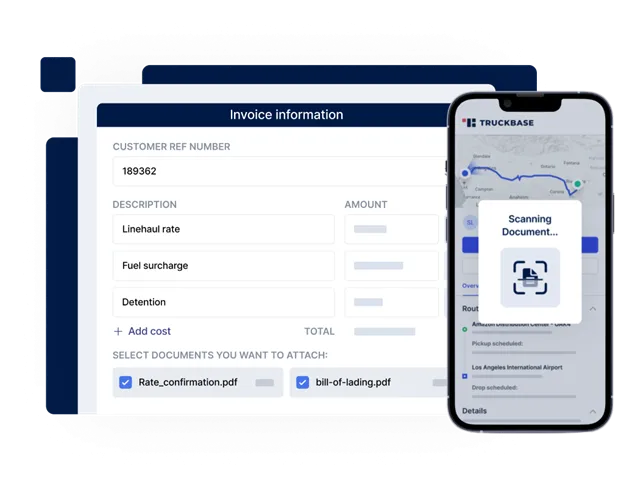Best Trucking Accounting Software 2024

If you’re simply looking for a bookkeeping tool, you can stop reading here, and look no further than QuickBooks. If you’re embracing the notion that trucking accounting goes far beyond that, or want to have a more expansive trucking accounting system of which QuickBooks is a key part, then read on.
The key missing link between QuickBooks and your trucking operation is joining financial data with operational data, to create a holistic picture of your fleet’s performance.
To effectively account for your business and performance, you need to cover accounting, dispatching, vehicle tracking, maintenance, fuel, insurance, and other miscellaneous expenses, along with billing and invoicing data. Modern platforms such as Truckbase offer a comprehensive and actionable dashboard that is pivotal to maintaining profitability while driving growth.
Beyond Financial Accounting
360-Degree View of Operations and Finance
Trucking industry accounting, when done well, goes beyond tracking financial transactions and basic record-keeping. It adopts a holistic management approach, encompassing all business and operational data. This broader perspective ensures comprehensive accountability for every mile, load, and gallon of fuel consumed, tying them not only to financial costs but to operational efficiency and facilitating regulatory compliance. It creates a unified system where financial health and operational performance provide a complete business overview.
Integration with QuickBooks
Bridging Financial Management and Operational Needs
The integration with QuickBooks is a prime example of how trucking accounting software bridges the gap between financial management and operational demands. Whether or not you use QuickBooks Online (QBO) or QuickBooks Desktop (QBD), your TMS should integrate seamlessly.
This feature allows for the automatic transfer of financial data from dispatch operations into the accounting system, ensuring accuracy and efficiency in financial reporting. It eliminates manual data entry, reduces errors, and saves time, demonstrating the importance of a unified system where financial and operational data converge for informed decision-making.
Invoicing should also be a second-nature activity for your truck accounting system. Being able to seamlessly deliver those to customers, as well as automatically sync them back and forth with QuickBooks, is a prime example of how automation can make your trucking accounting practices more efficient.
Truck Level Profit & Loss Management
Visibility Into Revenue and Key Expenses
A crucial component of trucking accounting software is its capability to generate Truck Level Profit and Loss (P&L) statements. This feature allows for detailed tracking and analysis of both your revenue line items by customer and truck, as well as expenses such as maintenance, fuel, repairs, and other operational costs on a per-truck basis.
Do you know which customers are your most profitable, and why? Which lanes seem to cause the most wear and tear on your fleet? Which lanes seem to have the best fuel costs and efficiency?
Understanding the cost implications of each vehicle in the fleet offers invaluable insights into operational efficiency and cost management. It enables operators to identify which trucks are most profitable, which routes yield the best returns, and where cost savings can be realized. This level of granularity in financial reporting is essential for strategic planning and optimizing the profitability of each asset in the fleet.
Adapting to Business Needs
Scalability and Customization
The strength of trucking accounting software lies in its adaptability and scalability, catering to the unique needs of each trucking company. Whether managing a fleet of ten or a hundred trucks or more, the right software provides scalable solutions to efficiently handle both financial and operational data. This flexibility ensures that businesses of any size can benefit from comprehensive data management, supporting growth and operational excellence.
Conclusion
The integration of operational data from dispatch systems like Truckbase with financial accounting through platforms like QuickBooks transcends traditional accounting practices. It emphasizes a comprehensive approach, vital for the modern trucking business. As the industry evolves, robust trucking accounting software becomes indispensable, guiding companies through the complexities of the business landscape towards sustained growth and profitability.
Trucking Accounting Software FAQs
How does integrating operational data improve my trucking business?
Integrating operational data with financial accounting enables more informed decision-making, optimizing routes, fuel consumption, and overall operational efficiency while ensuring regulatory compliance.
What is the difference between Truckbase and QuickBooks for trucking operations?
Truckbase offers a comprehensive solution that integrates financial data with operational data, providing a holistic view of your fleet's performance, whereas QuickBooks focuses mainly on financial bookkeeping. Truckbase integrates with both QuickBooks Online and QuickBooks Desktop.
Can Truckbase handle Profit and Loss management at the truck level?
Yes, Truckbase can generate detailed Truck Level Profit and Loss statements, allowing you to track expenses and operational costs for each vehicle to determine profitability accurately.
How can trucking accounting software enhance regulatory compliance for my fleet?
Trucking accounting software helps manage compliance by tracking and reporting on all financial and operational data relevant to regulations, ensuring you meet industry standards and avoid penalties.
What key features should I look for in trucking accounting software?
Look for software that connects your dispatch workflows to your accounting system. You also want one that offers real-time tracking, expense management, integration with fuel cards, maintenance scheduling, and the ability to generate detailed reports for both financial and operational analysis.
How does trucking accounting software contribute to fuel cost management?
Such software can analyze fuel consumption patterns, identify inefficiencies, and suggest optimizations for routes and load planning, directly contributing to reduced fuel costs and increased profitability.
Other articles to check out:
- Best Truck Dispatch Software
- Trucking Management Software Buyer’s Guide
- QuickBooks for Trucking
- Best Carrier TMS Software: How to Choose
The above article is sponsor-generated content. To learn more about sponsor-generated content, click here.

